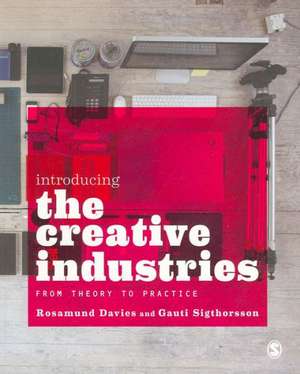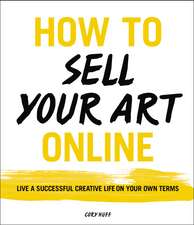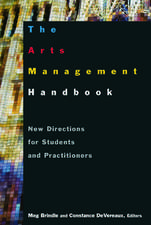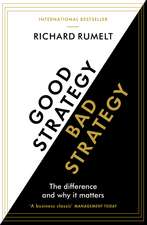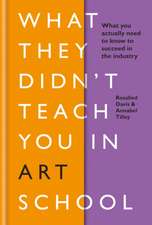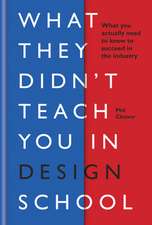Introducing the Creative Industries: From Theory to Practice
Autor Rosamund Davies, Gauti Sigthorssonen Limba Engleză Paperback – 21 apr 2013
- Angela Birchall, School of Media, Music & Performance, Salford University
This is your complete guide to studying and succeeding in the creative industries. This book takes you through the history, trends, products and markets of the creative industries, showing how success depends on a mix of ideas, tactics and talent.
When understanding social networks and cultural economy is just as important as hands-on skills or an entrepreneurial spirit, Introducing the Creative Industries shows you how to use theories, concepts and practical skills to get ahead in their course and professional life. Creatively imagined and beautifully written, this book:
- Interweaves theoretical concepts and professional practice on every page
- Uses cultural economy to teach the essential concepts and thinkers
- Integrates case studies from fashion and gaming to journalism and music
- Teaches strategies for navigating the links between skills, industries, creativity and markets.
This book shows you how to spot opportunities and use your knowledge and savvy to take kickstart your career in this fast-moving industry. It is an essential guidebook for students of creativity in media and communication, design, creative industries and business.
| Toate formatele și edițiile | Preț | Express |
|---|---|---|
| Paperback (1) | 334.39 lei 3-5 săpt. | +27.18 lei 7-13 zile |
| SAGE Publications – 21 apr 2013 | 334.39 lei 3-5 săpt. | +27.18 lei 7-13 zile |
| Hardback (1) | 727.05 lei 6-8 săpt. | |
| SAGE Publications – 21 apr 2013 | 727.05 lei 6-8 săpt. |
Preț: 334.39 lei
Nou
Puncte Express: 502
Preț estimativ în valută:
63.99€ • 69.72$ • 53.92£
63.99€ • 69.72$ • 53.92£
Carte disponibilă
Livrare economică 02-16 aprilie
Livrare express 19-25 martie pentru 37.17 lei
Preluare comenzi: 021 569.72.76
Specificații
ISBN-13: 9781849205733
ISBN-10: 1849205736
Pagini: 280
Ilustrații: black & white illustrations, black & white line drawings, figures
Dimensiuni: 186 x 232 x 19 mm
Greutate: 0.5 kg
Ediția:1
Editura: SAGE Publications
Colecția Sage Publications Ltd
Locul publicării:London, United Kingdom
ISBN-10: 1849205736
Pagini: 280
Ilustrații: black & white illustrations, black & white line drawings, figures
Dimensiuni: 186 x 232 x 19 mm
Greutate: 0.5 kg
Ediția:1
Editura: SAGE Publications
Colecția Sage Publications Ltd
Locul publicării:London, United Kingdom
Recenzii
With the rapid growth in opportunities to work in the creative industries, there is a need for books that clearly outline the key issues. With a book rich with case studies and definitional materials, Davies and Sigthorsson have admirably met this challenge.
Professor Terry Flew
Queensland University of Technology
Full, fresh and fun, but also hard work - absorbing, detailed and ambitious. That's the creative industries, and also this book. It suits what it studies, showing how human creativity, meaningfulness and experience are organised at industrial scale. Aimed squarely at those who will be the workforce and wealth-creators of the future, this is the go-to guide for understanding a complex and varied market.
John Hartley
Curtin University, Australia, and Cardiff University, Wales
Professor Terry Flew
Queensland University of Technology
Full, fresh and fun, but also hard work - absorbing, detailed and ambitious. That's the creative industries, and also this book. It suits what it studies, showing how human creativity, meaningfulness and experience are organised at industrial scale. Aimed squarely at those who will be the workforce and wealth-creators of the future, this is the go-to guide for understanding a complex and varied market.
John Hartley
Curtin University, Australia, and Cardiff University, Wales
Cuprins
Introduction: How to Use This Book
Chapter 1: What are the Creative Industries?
Defining the Creative Industries
Studying the Creative Industries - Three Approaches
Chapter 2: Creativity and Commerce
Patronage: Wealth, Power and Religion in Italian Renaissance Painting
The Marketplace: English Theatre in the Time of Shakespeare
Reproduction and Mass-production: The Print Revolution
Industrial Production
Industrialised Media Production: The Studio system
PART ONE: WORKING IN THE CREATIVE INDUSTRIES
Chapter 3: Institutions, Ownership and Entrepreneurship
The Organisation of Production
Workplaces
Work Structures
Work Patterns
Finding Work
National and International Perspectives
Chapter 4: The Business of Creativity
Sole Traders and Micro Businesses
Financing a Creative Business
Contracts and Rights
Business Models
PEST: Political, Economic, Social and Technological Factors
Clustering and the Sense of Creative Community
Chapter 5: Work Routines and Work Cultures
Employees: Staffers, In-house Workers
Freelancers and Portfolio Workers
Networking
Equality of Opportunity?
PART TWO: PRODUCTION AND CIRCULATION OF PRODUCTS
Chapter 6: Creative Producers and Products
Creative Goods and Services: Tangible and Intangible
Creative Originals Producers
Creative Content Producers
Creative Experience Providers
Creative Service Providers
From Simple Creative Goods to Complex Creative Goods
Chapter 7: Research, Development and Production
Research and Development
Production
Chapter 8: Circulation: Marketing and Distribution of Creative Products
Circulation
The Mass Market Model
Channels of Distribution and Marketing
What is Marketing?
Selling Stuff: Retail and its Disruptions
PART THREE: THE CREATIVE ECONOMY
Chapter 9: Institutional Commissioning and Financing Structures
Business Models in the Television Sector
Commissioning in Television
How Do Writers and Producers Get TV Commissions?
Finding a Route In
Commissioning and the Business of Magazine Publishing
Chapter 10: Clients, Funders and Going it Alone
Working to Brief: The Client Relationship.
Public Funding
Entrepreneurial Approaches
Self-funding
Crowdfunding
Chapter 11: The Changing Economic Landscape
Creativity and Commerce: Novelty, Risk and Change
Changing Work Routines and Work Cultures
Changing Structures and Models
Jobs That Don't Exist Yet
Glossary
Chapter 1: What are the Creative Industries?
Defining the Creative Industries
Studying the Creative Industries - Three Approaches
Chapter 2: Creativity and Commerce
Patronage: Wealth, Power and Religion in Italian Renaissance Painting
The Marketplace: English Theatre in the Time of Shakespeare
Reproduction and Mass-production: The Print Revolution
Industrial Production
Industrialised Media Production: The Studio system
PART ONE: WORKING IN THE CREATIVE INDUSTRIES
Chapter 3: Institutions, Ownership and Entrepreneurship
The Organisation of Production
Workplaces
Work Structures
Work Patterns
Finding Work
National and International Perspectives
Chapter 4: The Business of Creativity
Sole Traders and Micro Businesses
Financing a Creative Business
Contracts and Rights
Business Models
PEST: Political, Economic, Social and Technological Factors
Clustering and the Sense of Creative Community
Chapter 5: Work Routines and Work Cultures
Employees: Staffers, In-house Workers
Freelancers and Portfolio Workers
Networking
Equality of Opportunity?
PART TWO: PRODUCTION AND CIRCULATION OF PRODUCTS
Chapter 6: Creative Producers and Products
Creative Goods and Services: Tangible and Intangible
Creative Originals Producers
Creative Content Producers
Creative Experience Providers
Creative Service Providers
From Simple Creative Goods to Complex Creative Goods
Chapter 7: Research, Development and Production
Research and Development
Production
Chapter 8: Circulation: Marketing and Distribution of Creative Products
Circulation
The Mass Market Model
Channels of Distribution and Marketing
What is Marketing?
Selling Stuff: Retail and its Disruptions
PART THREE: THE CREATIVE ECONOMY
Chapter 9: Institutional Commissioning and Financing Structures
Business Models in the Television Sector
Commissioning in Television
How Do Writers and Producers Get TV Commissions?
Finding a Route In
Commissioning and the Business of Magazine Publishing
Chapter 10: Clients, Funders and Going it Alone
Working to Brief: The Client Relationship.
Public Funding
Entrepreneurial Approaches
Self-funding
Crowdfunding
Chapter 11: The Changing Economic Landscape
Creativity and Commerce: Novelty, Risk and Change
Changing Work Routines and Work Cultures
Changing Structures and Models
Jobs That Don't Exist Yet
Glossary
Notă biografică
Descriere
A much needed textbook taking students through both the theory and practice of both studying and working in the creative industries.
